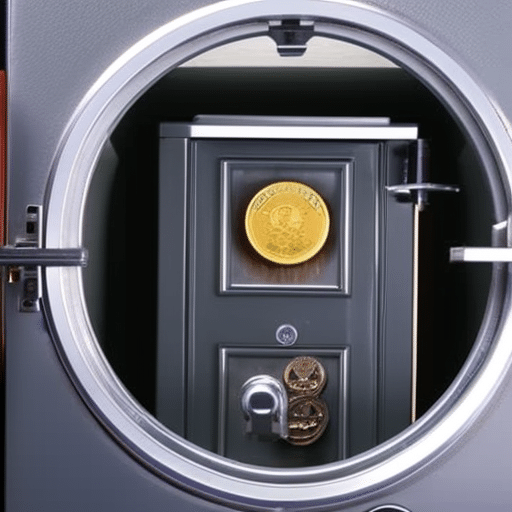Hey, you! Are you interested in using PI coin but not sure how to stay safe? You’ve come to the right place!
In this article, we’ll be discussing the safety protocols associated with the use of PI coin. We’ll cover key topics such as what PI coin is, how to secure your accounts, the types of transactions available, potential security risks, and best practices to keep your PI coin safe.
So, let’s get started and make sure you’ve got the knowledge you need to keep your PI coin safe!
What is PI Coin?
PI Coin is a revolutionary cryptocurrency that’s easy and safe to use – so let’s explore how it works!
PI Coin is a digital currency that operates on a decentralized, open-source blockchain network. It was created to provide users with a secure and efficient way to store and transfer funds.
PI Coin is based on a proof-of-stake consensus mechanism, which means that users must have a certain amount of coins in order to participate in the network. This ensures that users are rewarded for their contributions to the network, and also provides a level of security against malicious actors.
PI Coin also employs a number of safety protocols, such as two-factor authentication and encrypted wallets, to ensure that users’ funds remain secure.
PI Coin is an innovative cryptocurrency that provides users with a secure and efficient way to store and transfer funds.
Securing Your PI Coin Accounts
Protecting your accounts is essential to ensure your financial security. When it comes to PI Coin, you want to make sure you’re taking the necessary steps to keep your accounts safe and secure.
First, you should always make sure you have a strong and secure password for your accounts. Avoid using easy-to-guess words or phrases, and instead use a combination of numbers, letters, and symbols. Make sure to frequently update your password, as well as any security questions or answers you may have.
You should also consider enabling two-factor authentication (2FA) for your accounts. This adds an additional layer of security to your accounts and requires you to enter a code sent to your phone or email each time you log in.
Keeping your PI Coin accounts secure is essential to protecting your financial security, so don’t take it lightly!
Types of PI Coin Transactions
When it comes to cryptocurrencies, there are various types of PI Coin transactions that can be completed. These transactions may include buying, selling, exchanging, transferring, and storing PI Coin.
The most popular type of transaction is buying, which involves the purchase of PI Coin from an exchange. When you buy PI Coin, the exchange will require you to provide your personal information and other documents in order to verify your identity.
Another type of transaction is selling, which involves the exchange of PI Coin for another currency, either fiat or cryptocurrency. This process is also known as trading. When you sell PI Coin, you may also be required to provide your personal information and other documents in order to complete the transaction.
Additionally, when transferring PI Coin, you may need to provide the recipient’s address and a fee in order to complete the transaction.
Finally, when storing PI Coin, it is important to use a secure wallet that has strong encryption and other security measures in place in order to protect your coins.
Potential Security Risks
With the rise of cryptocurrency, it’s important to be aware of potential security risks when dealing with PI Coin. One of the main security risks is the risk of a hacker gaining access to the user’s wallet. This could result in the hacker gaining access to all the PI Coins stored in the wallet, leaving the user without any funds.
Additionally, if the user isn’t careful and doesn’t take the proper security measures, the PI Coins could be stolen through phishing attacks.
To reduce the risk of these security threats, it’s important to use strong passwords, enable two-factor authentication, and be aware of any suspicious activity on the PI Coin network.
Additionally, it’s important to regularly check the balance of the wallet to ensure that no unauthorized transactions have taken place. It’s also important to only use trusted websites and exchanges when dealing with PI Coins.
By taking the proper security measures, users can ensure that their PI Coins are safe and secure.
Best Practices for PI Coin Safety
To ensure your PI Coin investments remain secure, it’s vital to stay up-to-date on the latest safety protocols and best practices. One of the most important safety protocols is to never share your private keys with anyone. This is the only way to ensure that your funds are secure from potential malicious actors.
It is also important to utilize strong passwords and two-factor authentication whenever possible. This can provide an extra layer of security and prevent unauthorized access to your accounts.
Another best practice for PI Coin safety is to never store your coins on an exchange. Instead, keep them in a secure, offline wallet. This is the safest way to store your coins as it ensures that they are not vulnerable to hacking attempts.
Additionally, it is important to regularly back up your wallet so that if anything happens to your device, you can easily regain access to your coins.
Following these best practices will help to ensure the safety of your PI Coin investments.
Conclusion
You’ve learned about PI Coin and how to keep your accounts safe. You also learned about the different types of transactions you can make with it. Now that you have a good understanding of these concepts, it’s important to remember the potential security risks associated with PI Coin.
The best way to keep your PI Coin safe is to use a secure wallet and keep your passwords and login information private. Be mindful of the type of transactions you make. With these safety protocols in place, you can ensure your PI Coin is secure and reliable.
